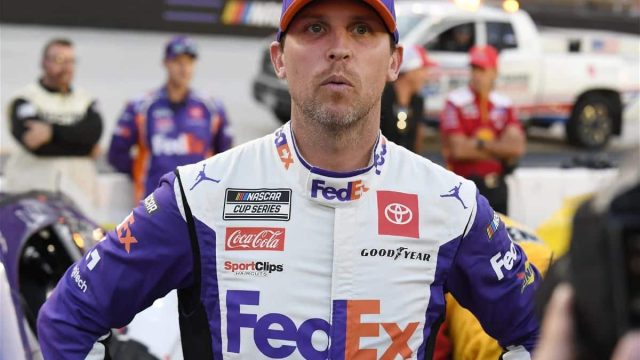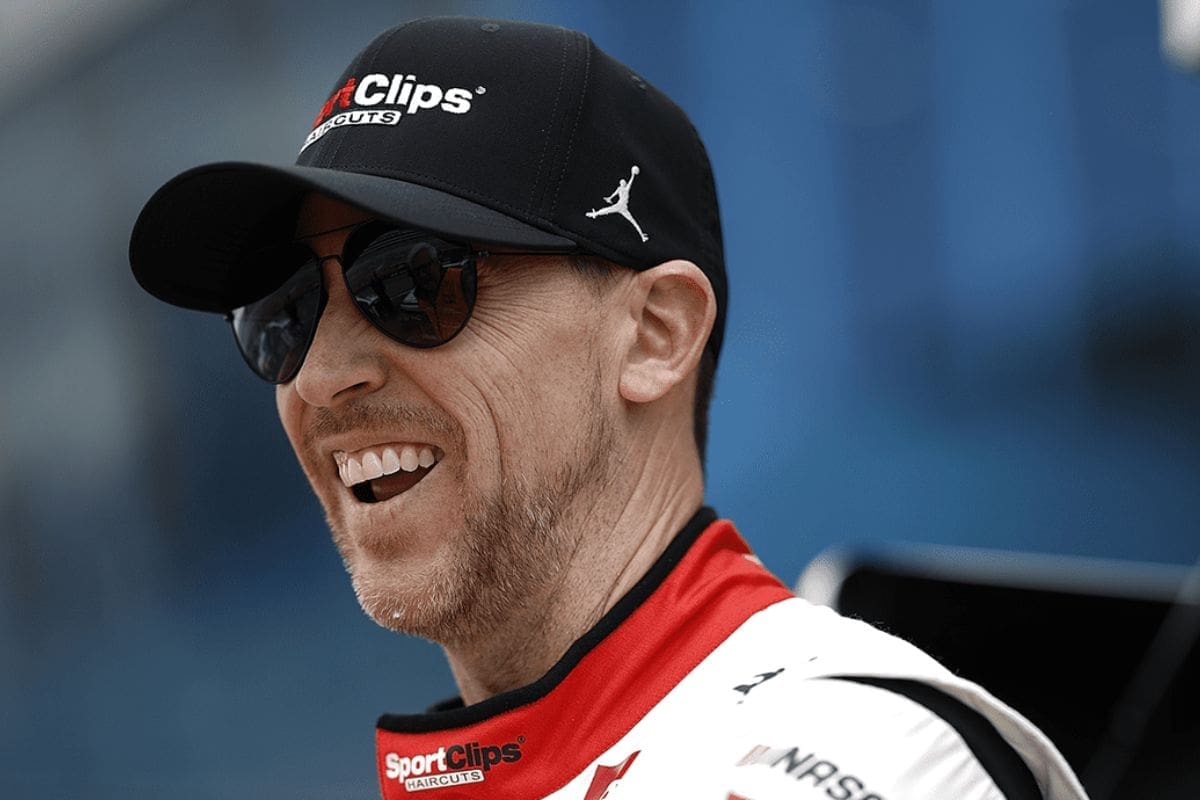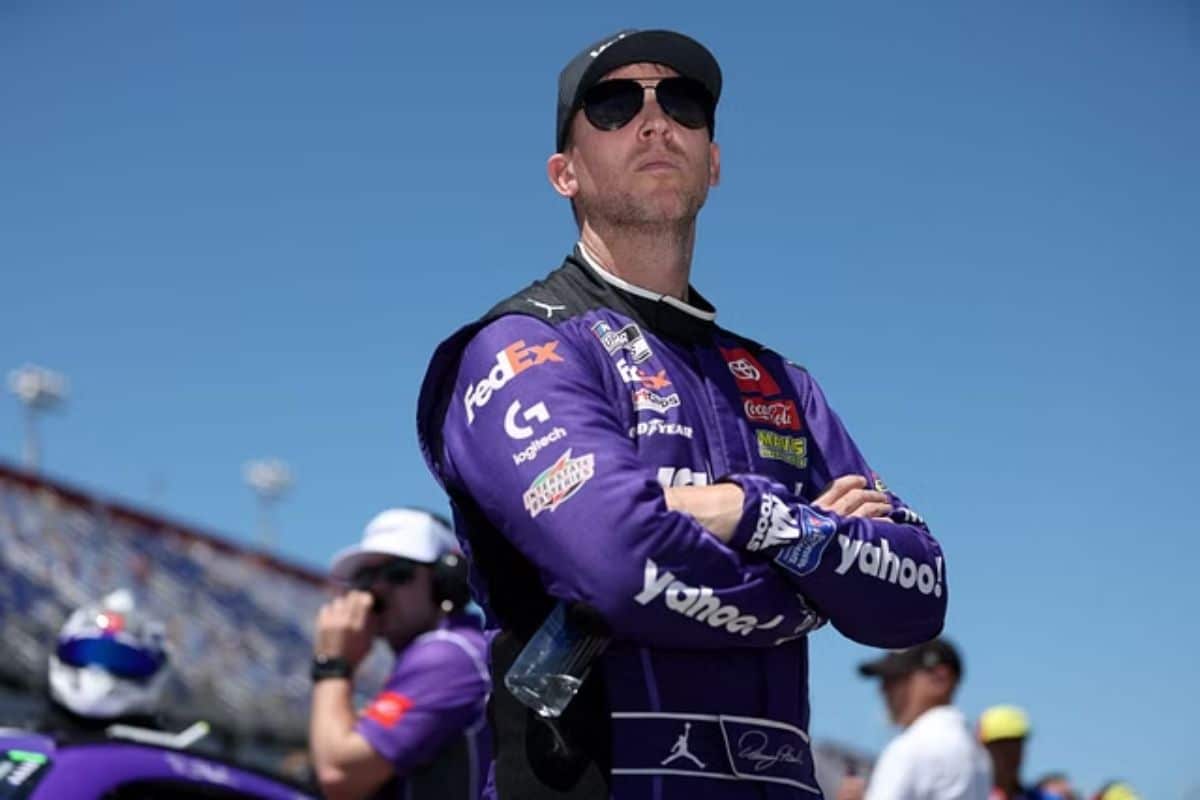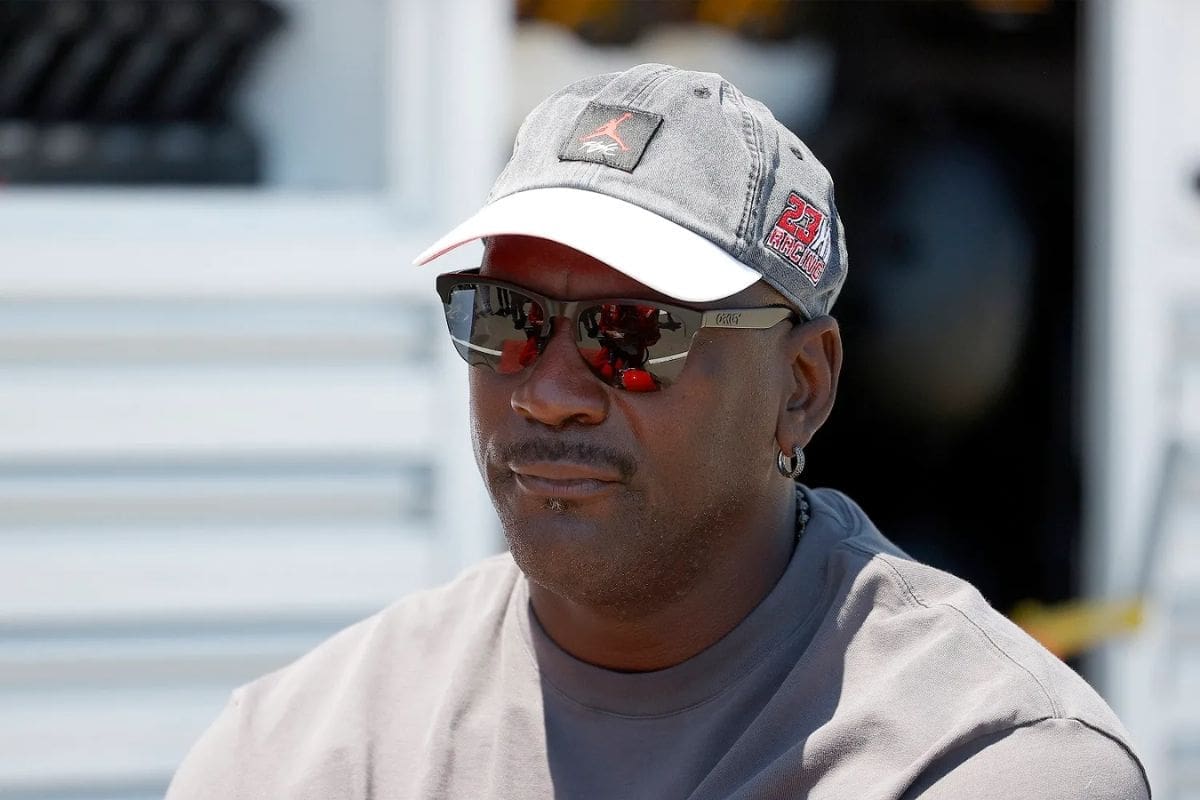Denny Hamlin Claims NASCAR Pushing Owners Out: Denny Hamlin‘s recent comments have ignited a critical discussion about NASCAR’s economic strategy, particularly considering the impending closure of Stewart-Haas Racing. Hamlin argues that the current financial model is unsustainable for team owners, suggesting that rising operational costs and stagnating revenues are driving them out of the sport. This perspective is particularly concerning given the significance of Stewart-Haas Racing’s exit, a team with a storied history in NASCAR. The situation raises pressing questions about the long-term viability of NASCAR’s business framework and the potential need for thorough reform to maintain competitiveness and innovation in the sport.
Key Highlights
- Denny Hamlin criticizes NASCAR’s strategy, claiming structural flaws are pushing team owners out.
- Hamlin points to Stewart-Haas Racing’s closure as evidence of rising costs and diminishing revenues.
- The expiration of 2016 charters is causing financial instability, according to Hamlin.
- Hamlin asserts NASCAR’s temporary charter system is unsustainable and damaging team morale.
- Hamlin calls for NASCAR to address systemic issues to prevent further team exits.
NASCAR Cup Teams Struggling with Business Model
Struggling with an unsustainable business model, NASCAR Cup teams find themselves increasingly vulnerable to financial instability and the risky nature of temporary charters. This model, which apparently provides stability and structure, in reality, imposes a risky existence on teams.
The reliance on temporary charters means that a team’s participation and financial viability are contingent upon continuous high performance. This creates an environment where a few poor races can threaten the entire operation, leading to a vicious cycle of financial strain and operational uncertainty.
The current NASCAR business framework necessitates a substantial investment in technology, personnel, and infrastructure to remain competitive. However, the return on investment is not proportionate, primarily due to the fluctuating nature of sponsorship deals and the impermanence of charters.
The temporary charters, which are basically licenses to compete, can be revoked or not renewed if a team underperforms. This creates a high-stakes scenario where teams must constantly excel or face the loss of their primary revenue-generating platform.
Moreover, the impermanent nature of charters aggravates financial instability. Teams are often left in a state of limbo, unsure if they will secure the necessary charter for the next season. This uncertainty affects long-term planning, sponsorship negotiations, and the team’s morale.
Stewart-Haas Racing Announces Closure
As the risky business model continues to strain NASCAR teams, Stewart-Haas Racing, a distinguished team with 69 Cup wins, has officially announced its closure, confirming nearly a year of speculation regarding the sale of its charters. This announcement marks a significant moment in NASCAR history, given Stewart-Haas Racing’s notable contributions to the sport and its competitive legacy.
Founded in 2009 by racing legend Tony Stewart and industrialist Gene Haas, Stewart-Haas Racing swiftly rose to prominence, securing multiple championships and establishing itself as a powerhouse in the Cup Series. The decision to close its doors signals not only the end of an era but also raises critical questions about the sustainability of NASCAR’s current economic framework.
While the exact reasons behind the closure are multifaceted, industry insiders point to escalating operational costs, diminishing sponsorship revenues, and the increasing complexity of maintaining competitive performance as contributing factors. The sale of charters, long rumored and now confirmed, highlights the financial challenges that even the most successful teams face in the modern NASCAR landscape.
This development reverberates through the NASCAR community, affecting drivers, team personnel, and fans in a similar manner. It also highlights a broader trend where historic teams are finding it increasingly challenging to navigate the sport’s evolving economic terrain. The closure of Stewart-Haas Racing serves as a stark reminder of the urgent need for structural reforms within NASCAR to safeguard the viability and competitiveness of its teams.
Denny Hamlin Exposes Illogical NASCAR Plan
At the end of 2021, new team owners were welcomed into the sport. NBA legend Michael Jordan and Grammy winner Pitbull joined NASCAR. The Next-Gen car was also about to be introduced. Rick Hendrick, Matt Kaulig, and Justin Marks were excited about the new owners. However, Denny Hamlin had some concerns.
“It’s very difficult for the new owners coming in because ultimately when you look at us, we don’t have billion-dollar businesses that we can leverage our partners in.” – (hamlin)
A joint statement from Tony Stewart and Gene Haas, the co-owners of Stewart-Haas Racing, regarding the future of our team following the 2024 season. pic.twitter.com/S9hkjnTNXi
— Stewart-Haas Racing (@StewartHaasRcng) May 28, 2024
Hamlin’s concerns have been aggravated by recent developments, including Tony Stewart and Gene Haas shutting down a two-time championship-winning team. This decision has brought to light the structural weaknesses within NASCAR’s charter system, which is approaching its expiration. The potential $200 million loss projected over the next five years has further highlighted the fiscal instability that many teams face.
The impending expiration of the 2016 charters has cast a long shadow over the sport, leading to financial instability and apprehension among team owners. Hamlin’s critique isn’t merely a rebuke but a clarion call for NASCAR to address these systemic issues before they lead to a broader exodus of team owners. His insights are grounded in the harsh realities that new entrants and established teams encounter, urging NASCAR to rethink its strategic framework to safeguard the sport’s long-term viability.
Hamlin Critiques NASCAR’s Strategy on His Podcast
On his podcast ‘Actions Detrimental,’ Hamlin offered a detailed critique of NASCAR’s current strategy, highlighting the impracticalities and challenges faced by prospective team owners. According to Hamlin, the organization’s vision of attracting new team owners is fundamentally flawed due to the current business model’s unsustainable nature. He pointed out that despite NASCAR’s apparent desire for a diverse array of owners, the financial and operational challenges make it exceedingly difficult for new entrants to thrive.
“I think that they believe that there are drivers just wanting to be NASCAR Cup Series owners…They don’t want some owners, but they want other owners…They would like the owners to come in. But until they change the business model for us, no one’s gonna do that. Those other owners I speak of, have tried it and gone out of business.” – (hamlin)
“They wanna have 15-20. That’s gonna be hard to achieve. I don’t know why they want so many…but maybe it’s because when you have less, it’s easier for them to get on the same page and the same ideals. When they want something, you’d have to listen to that smaller group.” – (hamlin)
Hamlin elucidated that NASCAR’s strategy seems to be a ‘divide and rule’ tactic, aimed at increasing the number of team owners to dilute collective bargaining power. ‘They wanna have 15-20. That’s gonna be hard to achieve,’ Hamlin remarked, suggesting that the proliferation of team owners would make it easier for NASCAR to manage and control dissenting voices. This sentiment highlights a critical tension between the sport’s governing body and its stakeholders.
The veteran driver also expressed skepticism about NASCAR’s understanding of the economic realities of team ownership. He noted that several individuals and groups have attempted to enter the sport, only to exit due to unsustainable financial challenges. ‘Those other owners I speak of have tried it and gone out of business,’ Hamlin stated, indicating that without significant changes to the business model, the influx of new owners will remain a distant dream.
Michael Jordan’s Concerns and SHR’s Struggles
Michael Jordan, co-owner of 23XI Racing, has expressed significant concerns about the economic viability of NASCAR’s current charter model, highlighting broader issues that are also evident in the struggles faced by Stewart-Haas Racing (SHR). Despite SHR drivers like Josh Berry and Noah Gragson showing signs of improvement, the flawed charter system imposes economic constraints that impede sustainable growth and investment. Jordan’s critique highlights a broader industry depression, indicating an urgent need for structural reform.
Jordan has articulated the necessity of permanent charters, which would allow teams to establish a stable revenue stream, attract new investors, and secure sponsorships. This viewpoint is widely shared within NASCAR circles, as demonstrated by SHR’s situation. SHR has encountered significant financial pressure following the departure of key sponsors like Anheuser-Busch and Smithfield Foods, and the economic instability has been worsened by Kevin Harvick’s departure. The absence of a permanent charter further complicates SHR’s ability to secure new sponsorships, creating a harmful cycle of financial uncertainty.
“If you had permanent charters, then you could create a revenue stream, either with new investors or different types of sponsorships that would subsidize that type of variance between ownership and the league.” – (jordan)
“That’s a big, big miss right there. If you don’t correct that, this sport’s going to die not because of the competition aspect, but because economically it doesn’t make sense for any businesspeople.” – (jordan)
Jordan echoes these concerns, stating that the lack of economic viability could endanger the future of NASCAR. “If you don’t correct that, this sport’s going to die,” Jordan cautioned, stressing the need for a business model that aligns with competitive dynamics. With the recent exit of Tony Stewart’s team, the necessity of addressing these economic flaws has never been more evident. The stakes are indeed high, and the need for reform is crucial to ensuring NASCAR’s long-term viability.
News in Brief: Denny Hamlin Claims NASCAR Pushing Owners Out
The closure of Stewart-Haas Racing and concerns raised by Denny Hamlin highlight significant issues within NASCAR’s current economic framework. Escalating operational costs and diminishing revenues pose substantial challenges for team owners, necessitating a reexamination of the sport’s business model.
The critique emphasizes the importance for structural reforms to guarantee sustainability and competitiveness within NASCAR. Addressing these economic challenges is crucial for preserving the viability of team ownership and the general health of the sport.
ALSO READ: NASCAR Informs Denny Hamlin About Tournament Bracket Before Announcement



